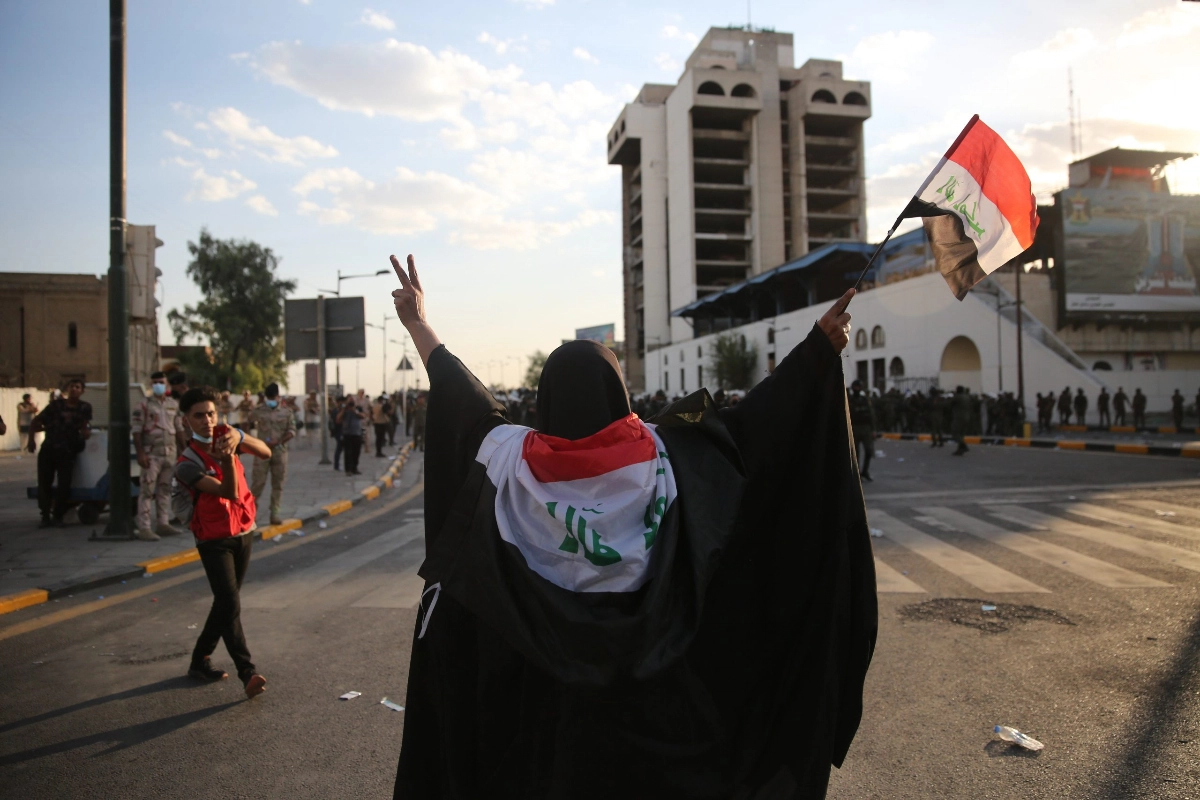Iraq: The present Iraqi state was established amid the dissolution of the Ottoman Empire after the First World War. Modern Iraq was established from the former three Ottoman provinces, Baghdad Vilayet, Mosul Vilayet and Basra Vilayet, which were known as Al-‘Iraq.
The present Iraqi state was established amid the dissolution of the Ottoman Empire after the First World War. Modern Iraq was established from the former three Ottoman provinces, Baghdad Vilayet, Mosul Vilayet and Basra Vilayet, which were known as Al-‘Iraq. The foundation was fragile and afflicted by many adverse fundamentals like undelineated and unstable borders with different sectarian and religious groups harbouring animosity with one another. Over the decades, this bitterness has openly escalated into violent sectarian conflicts, and the country in its present form carries a legacy of profound hatred among various sects and tribal leaders.
The Assyrians have withered in numbers after the Seyfo genocide; the Iraqi Jews are almost extinct but the Sunnis who seized enormous power during Saddam Hussein’s regime are now at loggerheads with the majority Shiites, who are holding power in the new Government formed with the overt and covert support of the US. The Kurds in the north who have been denied their due for ages have endured several massacres including a chemical genocide, of late established Kurdish Republican Government(KRG) an autonomous body fighting for more autonomy on the oil resources, if not total freedom from the Central Baghdad Government.
Sectarian conflicts which continued from ages were partially controlled by Saddam Hussein’s brutal acts
These underlying sectarian tensions were seemingly controlled only via a string of corrupt strongmen, especially in the era of Saddam Hussein who used very repressive methods to keep the various uprisings under control and the country together – a pattern that was eventually disrupted by the US invasion of Iraq in 2003, which has left Baghdad to this day without a coherent centralized government. The aftermath of the invasion represented an opportunity to explore partitioning the country on ethnic and religious grounds; however, this was not pursued, and sectarian tensions have only worsened since then.
Political power changed hands – Subjugation of one sect by the other still continues
It is alleged that numerous Sunnis who worked for the huge Iraqi Army and owed their allegiance to the previous Baathist regime were left out of work after the Army was disbanded by the US during their invasion in 2003-04, and this huge population is now left with waging war against the government or prowling at anything to feed their families. Out of retribution, the new Shiite-led government has alienated the Sunnis and the Kurdish from most of the State structures. Moreover, the invasion of 2003-04 which came as a geopolitical gift to Iraq, quickly filled the power vacuum, while changing hands from one sect to another, unfortunately, heightened the sectarian tensions between the Sunni and the Shiite communities. The ominous paradigm of a power struggle with one sect at the helm of affairs, subjugating the other, still continues with absolute impunity.
The destabilization has had a brutal domino effect on various ethnic minorities that have been historically marginalized under the state of Iraq—Yazidis, Kurds, and especially Assyrians. Assyrians and Yazidis, facing a precipitous population decline after the 2003 invasion, are in the process of extinction from their ancestral homelands. The representation of both ethnic groups in the Baghdad government is minuscule, with Assyrians represented in the broader Christian sect representing only five allocated seats in parliament. In Feb this year, Yazidis had their quotas revoked in the Iraqi court system, and their population continues to decline in the aftermath of mass kidnappings and ethnic cleansing perpetrated by ISIS.
The Kurds have consolidated with the fall of Saddam Hussein
The Kurds have long sought independence, building an ever-more autonomous Iraqi Kurdistan in the northeast. Numerous failed uprisings have taken place over the years, including the Anfal Genocide by the Baathist regime. After the fall of Saddam, the Kurds consolidated their hold over the northeast regions and even captured the strategically important city of Kirkuk during the war against Islamic State.
In the recent past, violence between the Sadrists and pro-Iran elements is rapidly escalating, calling into question the army’s capacity to quell the violence and, if the situation continues to deteriorate, even the chances of another civil war cannot be ruled out. The Iraqi army itself isn’t as strong as the Shiite militias who played a major role in curbing Islamic State’s advance, as evidenced in the infamous incident in 2014 in Mosul when soldiers openly abandoned their posts.
Along with the displacement of hundreds of thousands of Kurds during the fighting, Assyrian villages have been targeted as well, renewing fears of another mass exodus. The continuous Turkish military presence has also drawn the ire of residents, with protestors overrunning one military outpost, and Shiite militias firing rockets at Turkish military bases. Ankara’s moves have also drawn criticism from Washington, contributing further to the recent decline in US-Turkey relations.
Political Vacuum in Iraq since last one year has multipled the sectarian conflict many folds
Besides, Iraq was under the grip of a wider political crisis. After more than a year of political deadlock, Iraq will be ushering in a new government led by Mohammed Shia al-Sudani. Al-Sudani was chosen earlier this month to form a new government following months of infighting between key factions that paralysed political life for months.
Also Read: US: Barack Obama Tackles Heckler at US Rally, Says “Right now, I’m talking”
The political vacuum at the heart of Iraqi politics was pulling the country back toward the same tribal factionalism that fueled perpetual conflict since the dawn of the modern Iraqi state. And so long as parliamentary deadlock prevailed in Baghdad, Iraq’s marginalized ethnic groups continued to suffer. Looking ahead, the question of whether Iraq’s present borders can coexist with a functioning state remains as pertinent as ever and, sadly, if the present infighting and sectarian tensions continue unabated, future conflict is all but assured – with Iraq’s minorities set to bear the heaviest burden in the resulting upheaval.
God Bless the beautiful people of Iraq. The author has spent some good times in Iraq, interacting with a multitude of people from the South in Basra, to Suleimania, Erbil and the most dangerous Kirkuk in the North and Baghdad as well. The author also visited the ill-fated village of Halabja which was viciously attacked by chemical bombs. Besides, cherished memories of Mosul and Karbala still linger in mind.
Also Read: Maharashtra: State to introduce medical studies in Marathi from next academic year
For all the news update subscribe our YouTube channel ‘DNP India’. You can also follow us on FACEBOOK, INSTAGRAM and TWITTER.












